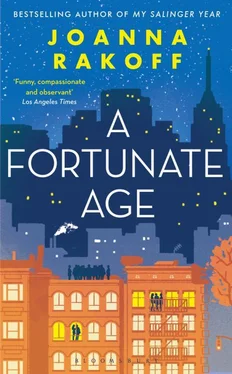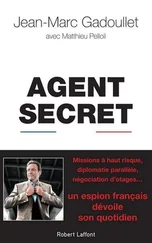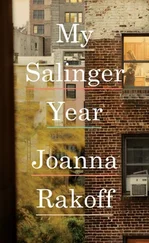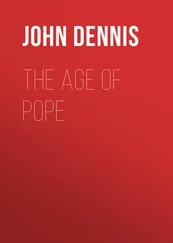Sometimes, he thought he saw Beth among this crowd of women and a little shiver went through him. But the tall girl sipping lemonade alone, making marks on a thick manuscript, was not Beth, nor was the fair-haired girl smiling calmly at a short, fat, freckled man. He would not admit that he was looking for her, that he was hoping to find her in his section, nor would he admit that he missed her—for he wasn’t even sure that he did—but he had no trouble confessing a less savory desire: he did not want her to marry Will Chase. Or anyone, for that matter. And yet, he did not want to marry her himself. And so he did nothing, nothing other than disparage Will to his friends—“Isn’t he kind of stiff ?”—and take home the endless rounds of women who, like Katherine, made themselves strangely available to him when he approached their table, notepad in hand: a wholesome-looking yoga instructor who liked to go to foreign films at the Quad (not French films, as would be Dave’s choice, but tragic Chinese and Indian social realist flicks about child prostitution and such); a sunburned blonde who had played guitar for Their Own Devices, a Chapel Hill band that had been famous for a moment in the mid-1990s, though, the girl explained, they’d made no money, really, despite having toured the world with Neil Young and Sonic Youth; a boyish French girl who drank wine by herself at the bar, scribbling in a little notebook, and whom he’d shocked with his decent French. He was particularly fond of a lawyer, an earnest lefty like his dad, who’d been in his class at Oberlin, tiny and vivacious, with bright black eyes and shiny black hair. He hadn’t known her at school, but she recognized him the moment he approached her table.
As of late, these girls were feeling rather neglected, for Dave’s free nights were becoming increasingly rare. The Reynold Marks shows were coming up, and nearly every night, he found himself walking over to DUMBO, trying to ward off the pangs of anxiety that this whole endeavor instilled in him. “You’ve got to just get over yourself,” Sadie kept telling him, and he knew she was right, but he still felt stupid and awkward around the band’s other four members, mostly because of the enormous—or, okay, big —discrepancy in their ages. The drummer, a spoiled kid named Marco LaRoue, was only nineteen, nearly ten years Dave’s junior. He’d been kicked out of Bard his freshman year for drug trafficking. Which sounded hard-core, but in reality he’d just received a packet of pot through the mail (a campus mailroom clerk had detected the scent and called the cops). Like Dave, he’d gone to St. Ann’s, but he was one of the rich kids. His father was some sort of big art dealer and the kid now had his own place, a loft in a mixed-use DUMBO building, not far from the practice space. His father, he said, had bought it as an investment, thinking he might want to open a satellite gallery in DUMBO and since it was just sitting there empty, well, why not move in, right? (“Yeah, man. Totally,” Dave had responded.) He was obnoxiously handsome in the manner of an Italian movie star: full lips, olive skin, dark curly hair, the sort of large, hooded eyes that celebrity journalists inevitably describe as “soulful.”
When the band went to Pedro’s for a beer after practice, girls stared at him, openmouthed, or whispered to one another, perhaps wondering if he was a movie star. Some nights, he sulked and ignored them. Others, he played up this attention, sending over drinks to a table of pretty girls and bowing in their direction, like James Bond or a Korean gangster, which made Dave want to puke, even as he wished he could pull off such suavity without seeming like a complete asshole. He treated Dave in a similar manner: Sometimes, he jumped off the ratty plaid couch they’d installed in the practice room and gave Dave a manly hug, kissing him on both cheeks (his mother was from Milan, his father a Brooklyn Jew who had spun LaRoue from Lazarowitzky), and offering him a beer. Other times, for no discernible reason, he simply glared at Dave, responding with extreme sarcasm to any words that emerged from Dave’s mouth. Sadie suggested that he was intimidated, owing to Dave’s advanced age and musical pedigree. Quizmaster Quest, after all, was the stuff of Oberlin legend—their tapes on rotation at WOBC—particularly now that Jan Jensen’s postcollege band, Ladderback, was getting some serious play. But Dave suspected it was the exact opposite: the guy thought Dave some sort of fogy, with his Cure and Smiths references, and his classical repertoire. He remembered, quite clearly, what it was like to be nineteen: twenty-seven had seemed impossibly old, an age he’d never reach.
Sundays and evenings, when Dave arrived at the DUMBO space, they were generally all there already, sitting around smoking pot and drinking beer, talking and laughing. Sometimes they stopped abruptly when he walked in the door, which terrified him (were they discussing him ?). Just as often, they simply ignored his arrival, the reedy Curtis continuing on whatever stream of thought he’d been following before Dave’s arrival. Had they all decided to meet early purposefully, in order to exclude him? Had they told Dave to come at eight, knowing they’d arrive at six thirty to share a pizza and perhaps trade stories about Dave’s lameness? Thinking about this possibility, he’d grow furious, for he was so utterly and decidedly not lame. He had not sold out. He hadn’t gone to law school or become a web designer or a day trader. And he knew more about music than the four of them put together. Not just classical or whatever— all of it, Beethoven, Schopenhauer, the Carter family, Bill Monroe, Gershwin, Elvis Costello, Hüsker Dü, the Sex Pistols, David Bowie, Bauhaus, Bob Dylan, Django Reinhardt, every fucking thing.
And the fact was that they were wasting him, wasting his talent and skill (playing these piddly little parts, not letting him write songs), not to mention his knowledge, his experience, even his Jan Jensen connections. He kept thinking he would quit, but then he would think better of it, mostly because of one incontrovertible fact: they were good. Really good. Curtis’s songs—which somehow managed to be both ironic and romantic—were lovely and true. It was a pleasure to play them. And yet, he wanted to play his own songs, which had, since his joining the band, begun to materialize. They were different from Curtis’s, of course, but in the dark of his apartment, at the ancient upright he’d pulled in off the street, or the too-expensive keyboard his uncle Steve had given him his first year at Eastman, they sounded just as good. Darker, plainer, more plaintive, and with, he thought, more humor. They were piano songs, of course, not guitar songs, though the guitar would come in, on most of them. And he wanted a violin—a fiddle, really—on some, a sort of Weimar sound on others.
“Does he even know you’re writing songs?” suggested Sadie, when he complained about Curtis and his lack of interest in Dave’s work for the millionth time. Dave was trying, really, to not be irritated by the fact that he now only saw her alone when Tal was out of town. Though he supposed he saw her more often than he saw Tal. “Why don’t you just tell him? Play them for him.”
“Trust me,” Dave told her. “He does not care. He knows I did comp at Eastman. He knows I’m writing stuff.”
“So, then why don’t you just quit and start your own band?” asked Sadie, in an overly patient way, as if to indicate that they had had this conversation before, hadn’t they, which, of course, made him furious.
“I don’t want to quit,” he told her. “I like the band. You don’t understand.”
Читать дальше












